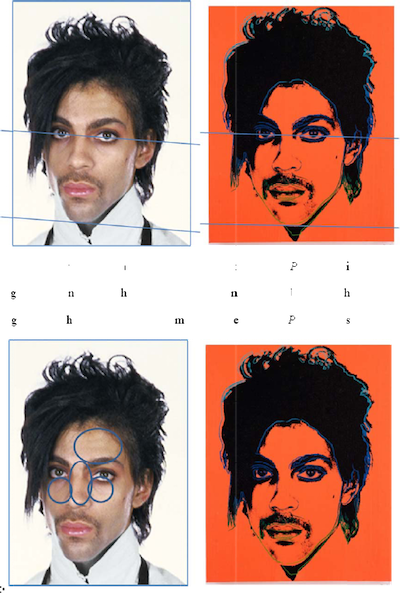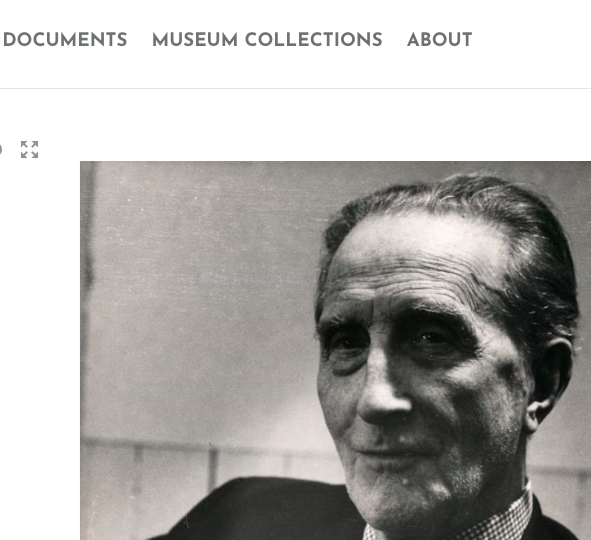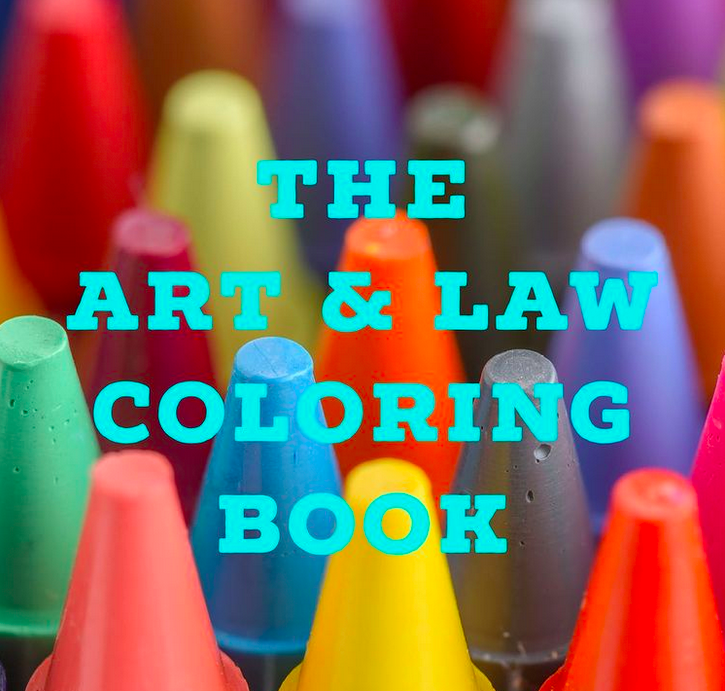A man accused of defacing a Picasso painting at a Houston museum surrendered to U.S. marshals at the U.S.-Mexico border yesterday.
Will textualism save our copyright planet? Warhol Fdn v. Lynn Goldsmith headed to SCOTUS
Images of Goldsmith and Warhol at issue. The U.S. Supreme Court will review a ruling that an Andy Warhol print infringed a copyrighted photograph taken by photographer, Lynn Goldsmith, of the late musician, Prince. We certainly hope--as much as one can hope for anything these days--that SCOTUS cleans up the wasteland that has become of "fair use" interpretation. One would think, and hope I suppose, that with many of the sitting justices adhering to textualism, they will fully jettison the nonsensical "transformativeness" test that has plagued us like a really bad case of Covid since the mid-1990s. Docs here, via ...


Podcast: Stephanie Drawdy and Sergio Munoz Sarmiento on All Things Art and Law
Ahh...Youth! Sergio Munoz Sarmiento. (2015 - ongoing), C-Print. © and TM Sergio Muñoz Sarmiento. All rights reserved. I had a lovely conversation with fellow lawyer and artist, Stephanie Drawdy, on the NFT craze, pets, art law, and the origins of The Art & Law Program. You can listen to the Podcast here. Hope you enjoy!


Marcel Duchamp archives now online, free of charge
The Philadelphia Museum of Art, the Centre Pompidou, and the Association Marcel Duchamp have digitized their vast archives of material on the Dadaist and placed it online, where it is free to all. Enjoy!


The Art & Law Coloring Book
If you have kids at home and want them to do something fun and educational, try the Art & Law Coloring Book, an ongoing project by The Art & Law Program. Really a great collection of drawings by great artists, including: Emma Jane Bloomfield Damien Davis Molly Dilworth João Enxuto Soda Jerk Clare Kambhu Alexandra Lerman Erica Love Douglas Melini Sergio Muñoz Sarmiento Melinda Shades Elisabeth Smolarz Gabriel Sosa Alfred Steiner Valerie Suter Happy coloring!


What are NFTs and what does it mean to own one?
If you're confused as to what the hell NFTs are, particularly art NFTs, here's a new article by Alfred Steiner that pretty much walks you through and safely out of the NFT hell. In his article, Steiner explains what NFTs are and what it means to own one. He also discusses why that meaning of ownership—which may appear novel to many—isn’t new at all when considered against the backdrop of the market for conceptual art. Steiner concludes with some observations about how NFTs may be good and bad for the art industry.


And it’s not for kids, or designed for kids.
The app, Marksta, was designed by photojournalist John D. McHugh, and here’s what it allows you to do.
Marksta allows you to watermark your photography, adding text or a logo directly from your iPhone. Copyright your images before sharing them to Facebook, Twitter, Instagram, Tumblr, etc. Or add your Twitter name, or your website address. Whatever you want to write, Marksta makes it simple and fast.
According to Marksta’s site, it only works on i-Phones and not all i-Pads. Hope they get a Motorola and Samsung version out soon.
Copyright, copyright, copyright…
A Swiss man cannot share in the settlement the Museum of Modern Art has paid to his relatives over the provenance of two Picassos.
Last September four of Picasso’s five surviving heirs—Claude, Paloma Picasso, Bernard Ruiz-Picasso, and Marina Ruiz-Picasso—circulated a letter announcing the establishment of a new procedure for authenticating works by the artist.
The letter states that all requests for authentication should henceforth be addressed to Claude, specifying that “only his opinions shall be fully and officially acknowledged by the undersigned.” Among the undersigned, however, one signature was conspicuously absent: that of Maya, the artist’s elder daughter.
Under French Law,
The right to authenticate Picasso’s work, however, is considered an inherited moral right, or droit moral. Only individual heirs have this right. When Claude [Ruiz-Picasso exercise’s] his droit moral to authenticate works by his father, he does so as an individual heir (as does Maya), not in his capacity as the estate administrator. Under French law, an artist’s descendants are presumed to have an innate understanding of—or at least a privileged firsthand familiarity with—the art created by their progenitor, and are thus entitled to issue certificates of authenticity.
So, it seems that there is now only one Picasso authority, minus one Picasso heir.
Via ArtNews.
 The 10th Circuit Court of Appeals has ruled that a stick figure cartoon character engaged in various everyday activities is not protected by copyright. When two similar drawings of stick figures share anatomical features such as arms, legs, faces, and fingers, these poses and the ideas and their drawings belong to the public domain.
The 10th Circuit Court of Appeals has ruled that a stick figure cartoon character engaged in various everyday activities is not protected by copyright. When two similar drawings of stick figures share anatomical features such as arms, legs, faces, and fingers, these poses and the ideas and their drawings belong to the public domain.
The case involves Albert and John Jacob’s Jake “Life is good” character and Gary Blehm’s Penman character. Blehm sued in 2009 alleging copyright infringement.
Is the Mattel v. MGA “Bratz” doll litigation still going on? Yes, 8 years and running. Ninth Circuit Chief Judge Alex Kozinski had a witty suggestion, “You could also go outside in the corridor and settle the case.”
Just as I was taking a break from a hectic 2012, a friend e-mails me Daniel Grant’s article for the Huffington Post on the pervasiveness of law and lawsuits in contemporary art.
It was big money that drove the lawsuits over the most recent art season, but these cases are notable because they ask basic questions, from what is art to who decides where and how it will be sold and displayed. They are questions that in an earlier age might have been more a part of the general discourse — there was a time when art exhibitions elicited outrage and debate! — but are now left to the courts to decide.
So, if you still haven’t made your 2013 new year’s resolution, here’s a suggestion: Learn as much about copyright, contracts, authentication and moral rights as you possibly can.
Clancco, Clancco: The Source for Art & Law, Clancco.com, and Art & Law are trademarks owned by Sergio Muñoz Sarmiento. The views expressed on this site are those of Sergio Muñoz Sarmiento and of the artists and writers who submit to Clancco.com. They are not the views of any other organization, legal or otherwise. All content contained on or made available through Clancco.com is not intended to and does not constitute legal advice and no attorney-client relationship is formed, nor is anything submitted to Clancco.com treated as confidential.
Website Terms of Use, Privacy, and Applicable Law.


